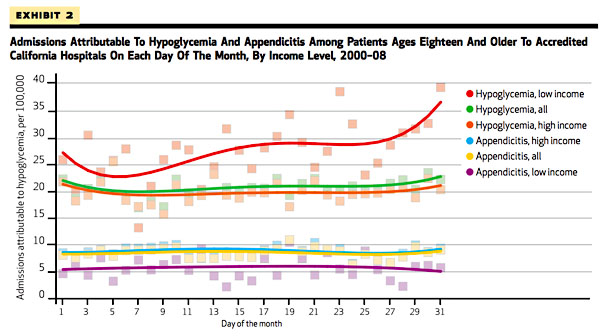Hypoglycemia is an ever-present threat among diabetics who are being treated with insulin injections. Generally speaking, it’s caused by inadequate nutrition leading to dangerously low blood sugar, and it can usually be fixed by simply eating enough. But what if you’re poor, and at the end of the month you don’t have enough money left to buy adequate food? Adrianna McIntyre passes along this devastatingly simple chart that shows exactly what happens:

Take a look at the top three lines. Among those with high incomes, the risk of hypoglycemia is about the same all month long. But the red line shows the incidence of hypoglycemia among the poor. It goes down at the beginning of the month, when money is available for food, rises a bit in the middle of the month, and then jumps dramatically in the final week when money is tight. As a check to make sure that tight budgets really are at fault, the authors ran the same test on the incidence of appendicitis, which should be unrelated to income. It was.
McIntyre uses this as an object lesson: although policy wonks tend to focus a lot of attention on insurance and health care financing, there are plenty of other things that affect health. What’s more, solutions aren’t simple:
These findings also illustrate the difficulty in finding policy solutions to address health disparities. The authors note that food pantries and soup kitchens already ramp up staffing and resources toward the end of the month. We could explore different ways to distribute existing benefits, but that may have other negative impacts (ie: making it harder to pay rent or bills at the beginning of the month).
Nothing is ever easy.













